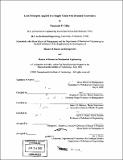Lean principles applied to a supply chain with demand uncertainty
Author(s)
Gillio, Emanuele F. (Emanuele Filiberto), 1973-
DownloadFull printable version (6.038Mb)
Other Contributors
Leaders for Manufacturing Program.
Advisor
Stephen C. Graves and James M. Masters.
Terms of use
Metadata
Show full item recordAbstract
This thesis describes the work performed over a six and a half month internship at Eastman Kodak Company in Rochester, NY. The thesis focuses on the implementation of a lean manufacturing system, modeled after the Toyota Production System, in the Kodak color film business. The goal of the system is to systematically eliminate all forms of waste from the production process in an attempt to reduce costs and inventory. This thesis approaches the problem from two different points of view. On the one hand, it takes a high level view of the entire supply chain and describes how material and information should flow through the supply chain. It highlights where inventory buffers should be located and which operations should be improved in order to reduce the size of these buffers. Finally, this thesis highlights the importance of leveling the customer demand signal in order to implement a true pull system using Kanbans. On the other hand, this thesis describes the implementation of lean manufacturing tools such as Kanban systems and Heijunka boards in some Kodak operations. This work includes the use of tools such as visual signals, cellular manufacturing, Kanbans, Heijunka boards, etc. The work performed over the internship sets the foundation for the transformation of the Kodak supply chain into a lean supply chain capable of dealing with uncertain demand. Additionally, the work can easily be transferred and applied to other Kodak businesses such as paper and photochemicals.
Description
Thesis (S.M.)--Massachusetts Institute of Technology, Sloan School of Management; and (S.M.)--Massachusetts Institute of Technology, Dept. of Mechanical Engineering; in conjunction with the Leaders for Manufacturing Program at MIT, 2002. Includes bibliographical references (leaves 74-75).
Date issued
2002Department
Leaders for Manufacturing Program at MIT; Massachusetts Institute of Technology. Department of Mechanical Engineering; Sloan School of ManagementPublisher
Massachusetts Institute of Technology
Keywords
Sloan School of Management., Mechanical Engineering., Leaders for Manufacturing Program.